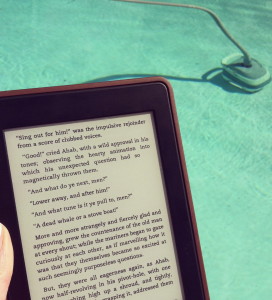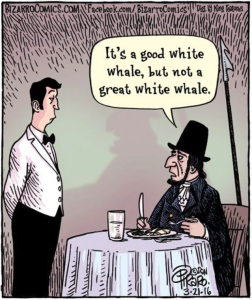I know it’s hard to believe, but we read the entire thing: Moby-Dick by Herman Melville. Note the hyphen. If you don’t remember anything else, remember the hyphen.
Jennifer: Instead of “Call me Ishmael,” I’d begin the book like this: “Get me Queequeg.” Before we really begin, however, we might want to note that we’re both Moby-Dick failures. Lara, you go first. How are you a Moby-Dick failure?
Lara: Oh, I am a big fat Moby-Dick failure. I went into college determined to get my degree in English Literature. (And please pronounce that lit-tur-rah-ture, not litter-rat-chur). So, there I am taking wonderful classes on Chaucer and the early poets and then I have to take a full semester on John Milton, reading only Paradise Lost, and Herman Melville, reading only Moby-Dick. Milton totally lost me, and Melville harpooned me and what was once a major became a minor, and there you go. What’s your failure story?
Jennifer: Harpooned me—nice touch. Should we see how long we can sustain the fun? Well, it’s taken me a while to admit this, but I first did so in my review of William Giraldi’s Busy Monsters. During my final semester of my MFA program, I took an independent study with this great professor who we all loved—hi, Dr. Boyer! Miss your Garfield ties!—and I chose a bunch of books I never read but felt that I should’ve read if I were going to be this real writer person. Moby-Dick was among them. Then, once I started, I fell apart, skimmed it, and BS’d the entire discussion, which was one-on-one. I mean, I lied to the man’s face, and he was a man I respected! By the way, I give up already; I’ve got nothing like harpooned me.
Lara: I know I’m sounding super dramatic and everything, but this book blows. As hard as Moby’s spout. And the damn whale in question is only in three of the 135 chapters. What’s up with that? The book is a wreck. It reads very old to me and does not stand the test of time. The subject matter of whaling cannot compel us to classify this book as The Great American Novel, because I don’t think it’s a universal subject for most people. Plus he goes into WAY TOO MUCH detail about the anatomy of the whale and characters who don’t really matter. I think the book could have been significantly edited and focused on the “monomaniacal” Captain Ahab and his revenge tour to kill Moby. Did they not have editors in the 1800s?
Jennifer: Okay, Lara, let me just throw some lit-tur-rah-ture stuff at you. The subject matter is distinct from the theme. In this book, the subject matter (whaling, in this case) is not universal, but the theme may be. Theme has to do with meaning. Perhaps, the theme of Moby-Dick is universal. The bottom line is this: what does this chasing-whale-tail (not tale!) mean? I don’t want to put you on the spot, though I’m going to put you on the spot: what’s this white whale business all about?
Lara: And see, this is where you are just smarter than I am.
Jennifer: No, not true!
Lara: You are, and that’s okay. I know I’m smart. I’m not saying I’m not. Here’s the thing… I think the reason, the real reason, I never read this book is that I didn’t want to not understand it with all of its mythical, spiritual and metaphorical references. Because I am telling you, I don’t understand them. I don’t know what the significance of him chasing some big white sperm whale is. Unless it has something to do with the fact that Melville loves to use the words erect, erection and ejaculation. Twenty-nine times, in fact.
Jennifer: That’s why it’s called Moby-DICK.
Lara: Very racy for the 1800s! Was Melville repressed?
Jennifer: Alright, alright. You got me. I have no clue if Melville was repressed—and the truth is that I don’t care. Nor do I really know what the pursuit means. There, I said it. I admit it. I don’t know, and I don’t really care. Please don’t let this cost me my literary career.
Well, perhaps I’ll BS some more. Maybe there’s some kind of “noble savage” thing going on here with the harpooners Queequeg, Tashtego, and Daggoo. Maybe there’s some kind of racial question on the table since the whale is white. Maybe we should be considering gender politics, since there’s only one woman in the whole thing—and she’s your classic woman-as-cook type o’ gal. Maybe we should all read this book I once really did read called All Things Shining by Dreyfus and Kelly, which discusses this book in terms of the human plight for meaning in the secular age. Maybe that’s it. Let’s not forget that our hero, if he is our hero, is named Ishmael—and Ishmael was the illegitimate son of Abraham, the father of God’s Chosen People. Ishmael, the lone survivor, is the bastard child of Theism’s main patriarch. Is this the triumph of secularism? What does this make Ahab? The whale? Is the pursuit of the whale like the pursuit of God?
Lara, let me be frank: I don’t really care. The book was painful to read. Though some of the prose was truly lovely, I still don’t care. And lest you think it’s because the book is “old” or “outdated,” keep in mind that the stellar Jane Austen wrote all of her books before this, and Dostoyevsky and Twain wrote theirs only a bit later. It’s Melvi
lle. The book isn’t so hot. And, while I don’t doubt that some of our readers genuinely love it, my guess is that there’s some collective cultural pretending going on here: we’re all pretending this is a fabulous book.
Lara: Blah-biddy-blah-blah-blahhhhh. Nor do I care. But what I do care about is Moby-Dick being considered great literature. Certainly Austen, Dostoyevsky, and Twain wrote great things and they are much more consumable than Melville. I mean, at one point, he’s writing it as though there’s a musical going on! It’s just a giant shipwreck and I think to classify it as great is wrong. This book is a spirit breaker. It kind of breaks my spirit that this is required reading for so many.
And, I don’t know anyone who really thinks it’s fabulous. Not in real-life anyway.
Jennifer: You know what made me want to give it another try? Lauren Groff, who’s fabulous herself, proclaimed her love for it publically at a writing conference in Denver in 2010. I thought, If Lauren loves it, maybe I should. But I just don’t. My friend Anastasia may have said it best when she mentioned to me that the writing feels obstructed. Something is getting in the way of the prose. That something is Melville. Melville sabotages himself. Rather than keeping in mind that literature—to be great—must also be enjoyable (right?), he got caught up in his own grandiose techniques, his own encyclopedic entries. Snoozeville. Did you like anything about this?
Lara: I think you are totally right, Jennifer. I can’t believe it, but we are in agreement on this one. Oh, and there were two things I liked: the crazy cannibal and BFF to Ishmael, and that there was a first mate named Starbuck. It harkened to the modern world, my love of Chai (my grande non-fat, no water, light foam Chai latte) the one drink that kept me going through this messterpiece.
Here’s what would make me love it: Have an editor from today chop this behemoth down to 300 pages, focusing on Ahab, his quest for revenge and the ethical dilemma faced by Starbuck when he signs on for the voyage. Excise a few of the erections and this book could be pretty amazing.
Jennifer: I liked the Queequeg parts. You know, I also have this deep-seated ocean phobia. Its vast depths, its chill, its freaky creatures—these things enthrall me. I love a good I’m-surrounded-by-water narrative, but this one didn’t ROCK MY BOAT. I liked Jaws better. Even the shark flick with L.L. Cool J (Deep Blue Sea) was better. Open Water maybe sucked more. Before we sign off and/or get dismissed for our unscholarly near-Neanderthal approach to one of the most famous works of literature ever, let me just say that we did our homework. I know how Melville wasn’t a success during his lifetime (in fact, his sales sucked!) and Moby-Dick was a critical disaster. I know this potentially means nothing—since we’ve got others, like the shockingly brilliant Vincent Van Gogh, who also went unrecognized for their talents. But it may mean something too. I also know he was good friends with Nathaniel Hawthorne, and he famously told The Scarlet Letter author the following: “I have written a wicked book, and feel spotless as the lamb.” If you say so, Herman . . .
Then, I stopped doing my homework. Wicked, huh? Spotless as a lamb? Was he going for the biblical? Was he after salvation? All answers went down with the Pequod. Moby-Dick apparently disappeared into the depths.
I am a little ashamed of my dislike, but the lies must stop.
Next up, we’re slumming with The Hunger Games. But then, get ready: it’s George Saunders.
__________________________________________________________________________________________
Can’t get enough of Snotty Literati? Follow us on Facebook!
Want to read more from Jennifer? Check her out at www.jenniferspiegel.com
Want to see what Lara is up to? Go to www.onelitchick.com



So apparently Moby-Dick is a metaphor for something. I just didn’t get what it is. Life? Nah, that’s too simple. I think you both should read Ahab’s Wife to get a real feel for the subject.
“messterpiece” … priceless!
Thank you for reinforcing my lack of want or need to ever read this book! Loved your review and always witty banter, though as you got more in depth into your analysis I did start skimming, whoops! So tell me, was this worse than “A Confederacy of Dunces”? I couldn’t understand why that was a beloved Pulitzer Prize winning novel either, but let’s see what happens 100 years from now.
There is a HYPHEN in Moby-Dick?